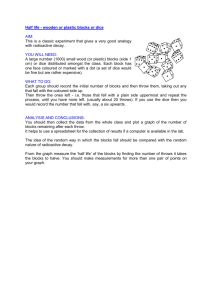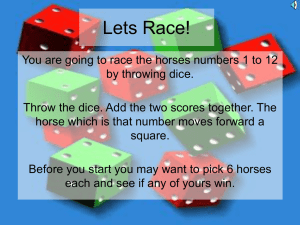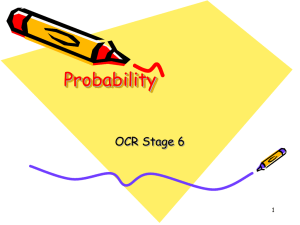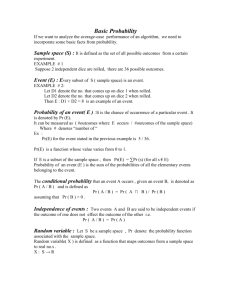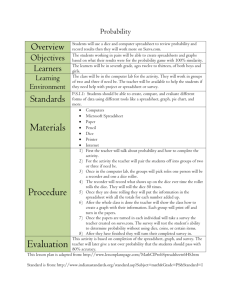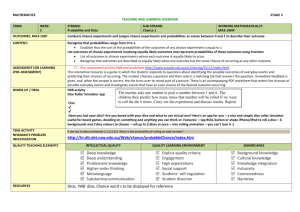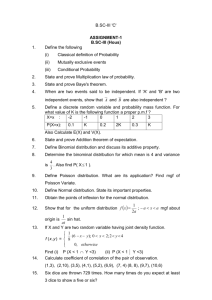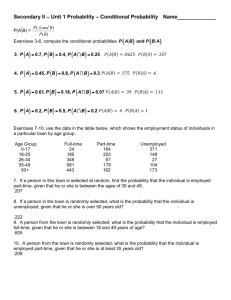Tai Sai Game Rules: Division 9
advertisement
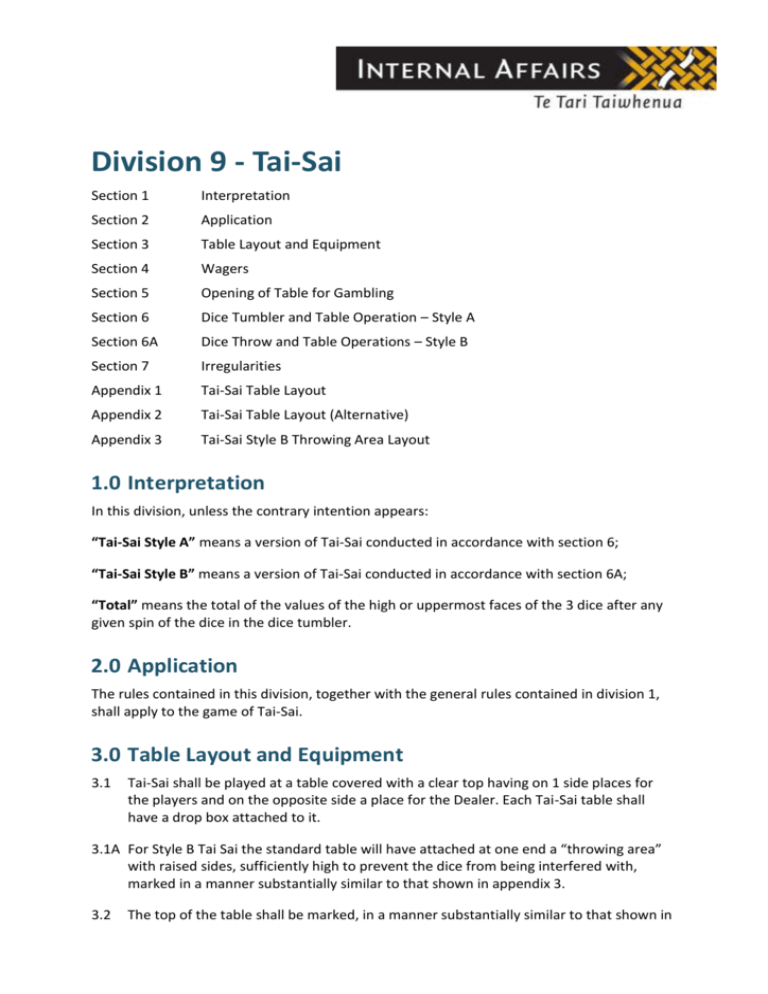
Division 9 - Tai-Sai Section 1 Interpretation Section 2 Application Section 3 Table Layout and Equipment Section 4 Wagers Section 5 Opening of Table for Gambling Section 6 Dice Tumbler and Table Operation – Style A Section 6A Dice Throw and Table Operations – Style B Section 7 Irregularities Appendix 1 Tai-Sai Table Layout Appendix 2 Tai-Sai Table Layout (Alternative) Appendix 3 Tai-Sai Style B Throwing Area Layout 1.0 Interpretation In this division, unless the contrary intention appears: “Tai-Sai Style A” means a version of Tai-Sai conducted in accordance with section 6; “Tai-Sai Style B” means a version of Tai-Sai conducted in accordance with section 6A; “Total” means the total of the values of the high or uppermost faces of the 3 dice after any given spin of the dice in the dice tumbler. 2.0 Application The rules contained in this division, together with the general rules contained in division 1, shall apply to the game of Tai-Sai. 3.0 Table Layout and Equipment 3.1 Tai-Sai shall be played at a table covered with a clear top having on 1 side places for the players and on the opposite side a place for the Dealer. Each Tai-Sai table shall have a drop box attached to it. 3.1A For Style B Tai Sai the standard table will have attached at one end a “throwing area” with raised sides, sufficiently high to prevent the dice from being interfered with, marked in a manner substantially similar to that shown in appendix 3. 3.2 The top of the table shall be marked, in a manner substantially similar to that shown in either of the appendices, with areas for the placement of the various wagers permitted in the game and their respective payout odds. 3.3 The table shall be fitted with electronic equipment which is: (a) (b) 3.4 linked to an entry terminal which is attached to the top of the table and has: (i) 6 buttons or switches numbered 1, 2, 3, 4, 5 and 6 respectively, (ii) 1 entry button, and (iii) 1 light-emitting diode, which gives visual verification of the last 3 numbered buttons or switches depressed, being the 3 numbers entered into the electronic equipment when the entry button is depressed; and programmed so that when the 3 winning numbers corresponding to a declared result of a game are entered into the equipment by the activation of the relevant numbered buttons or switches, all the areas of the layout representing the winning combination or combinations are illuminated. The following equipment shall also be used in the game: (a) when Non-Value Chips are in use at the table, a display rack, which shall be used to indicate the colours and values of the Non-Value chips; (b) when Non-Value Chips are in use at the table, marker buttons of different colours, sufficient to indicate the values of the subsets of Non-Value Chips in use; (c) a change block, which shall be used for the acceptance and exchange of Chips; (d) a set of 3 dice, constructed of plastic; (e) a dice tumbler (Style A) which shall: (i) be mechanically, electrically or electronically activated, (ii) be attached to the table, (iii) contain the dice under seal in a transparent compartment, (iv) have over the compartment securing the dice a dome-shaped, removable, nontransparent cover which conceals the dice while the tumbler is being shaken, and (v) be used to tumble the dice; (f) a bell; (g) at the option of the Casino Operator, a game results display, being an electronic device for recording and displaying the most recent winning results at the table; and (h) a dice “cup” (Style B) 4.0 Wagers 4.1 A player at the game may place the following wagers: (a) “Small”, which shall: (i) win if any of the Totals 4, 5, 6, 7, 8, 9 or 10 appears in any combination of the 3 dice, except in the case of triple 2 or triple 3, and Page 2 of 12 (ii) (b) (c) (d) (e) (f) (g) lose if any other Total appears, or if the Totals of 6 or 9 are determined as a result of the combination of the dice showing triple 2 or triple 3 respectively; “Big”, which shall: (i) win if any of the Totals 11, 12, 13, 14, 15, 16 or 17 appears in any combination of the 3 dice, except in the case of triple 4 or triple 5, and (ii) lose if any other Total appears, or if the Totals 12 or 15 are determined as a result of the combination of the dice showing triple 4 or triple 5 respectively; “Triples”, being a wager on any 1 of the specific triples 1, 2, 3, 4, 5 or 6, which shall: (i) win if that triple appears, and (ii) lose if any other combination appears; “Doubles”, being a wager on any 1 of the specific doubles 1, 2, 3, 4, 5 or 6, which shall: (i) win if that double appears, and (ii) win once only if a triple of the same number appears, and (iii) lose if any other combination appears; “Any Triple”, being a wager on any triple 1, 2, 3, 4, 5 or 6, which shall: (i) win if any of those triples appears, and (ii) lose if any other combination appears; “3 Dice Totals”, being a wager on any 1 of the following specific dice Totals of the 3 dice - 4, 5, 6, 7, 8, 9, 10, 11, 12, 13, 14, 15, 16 or 17 - which shall: (i) win if that Total appears in any combination of the 3 dice, and (ii) lose if any other Total appears; “Dice Combinations” of 1 and 2, 3, 4, 5 or 6, 2 and 3, 4, 5 or 6, 3 and 4, 5 or 6, 4 and 5 or 6, or 5 and 6, being a wager on any 1 of these specific combinations, which shall: (h) (i) win if that combination appears on 2 or more of the dice, and (ii) lose if any other combination appears; “Individual Die Face Values” of 1, 2, 3, 4, 5 or 6, being a wager on any 1 of those specific numbers, which shall: (i) win if that number appears on 1 or more of the dice, and (ii) lose if that number does not appear. And, where the alternative layout as shown in Appendix 2 is used: (i) “Three Dice Combinations”, being a wager on any one of the following specific three dice combinations of: 1,1 and 2,3,4,5 or 6 Page 3 of 12 2,2 and 1,3,4,5 or 6 3,3 and 1,2,4,5 or 6 4,4 and 1,2,3,5 or 6 5,5 and 1,2,3,4 or 6 6,6 and 1,2,3,4 or 5 1,2 and 3,4,5, or 6 1,3 and 4,5 or 6 1,4 and 5 or 6 1,5 and 6 2,3 and 4,5 or 6 2,4 and 5 or 6 2,5 or 6 3,4 and 5 or 6 3,5 and 6 4,5 and 6, which shall: (j) (k) (l) (i) win if that combination appears on the three dice; and (ii) lose if any other combination appears; “Four Number Combinations”, being a wager on any one of the following four number combinations of 6, 5, 4, 3 or 6, 5, 3, 2 or 5, 4, 3, 2 or 4, 3, 2, 1, which shall: (i) win if the three dice show 3 of the 4 of those numbers, and (ii) otherwise lose; “Odd”, being a wager which shall: (i) win if any of the Totals 5, 7, 9, 11, 13, 15 or 17 appears in any combination of the three dice, except in the case of triple 3 or triple 5, and (ii) lose if any other Total appears, or if the Totals 9 or 15 are determined as a result of the combination of the dice showing triple 3 or triple 5 respectively; “Even”, being a wager which shall: (i) win if any of the Totals 4, 6, 8, 10, 12, 14 or 16 appears in any combination of the three dice, except in the case of triple 2 or triple 4, and (ii) lose if any other Total appears, or if the Totals 6 or 12 are determined as a result of the combination of the dice showing triple 2 or triple 4 respectively. 4.2 Whether a wager wins or loses is determined by the values appearing on the high or uppermost faces of the dice. Only 1 face on each die shall be considered high or uppermost. 4.3 All wagers shall be made by placing either Value Chips, with the smaller denomination Chips on top, or Non-Value Chips in the appropriate wager area of the Tai Sai layout. A wager must be placed within the wagering segment marked on the layout. Nothing in this rule shall prevent the Casino Operator from paying a wager that is touching the line of the wagering segment within which it has been placed provided the Casino Page 4 of 12 Operator is satisfied as to its intended positioning. 4.4 No wager shall be placed until all winning wagers on the previous spin have been paid. 4.5 Orally declared wagers shall be accepted only when accompanied by Chips and if the Dealer has enough time to place the wager on the layout before “No more bets” is called. 4.6 Each player shall be responsible for the correct placement of his/her wager on the layout whether or not he/she is assisted by the Dealer. Each player shall be responsible for ensuring that any instructions he/she gives to the Dealer regarding the placement of his/her wager are correctly carried out. 4.7 Except as permitted by these rules, once the Dealer has called “No more bets” no player shall: (a) make any wager; or (b) handle, alter or withdraw any wager until all winning wagers in that wagering area have been paid by the Dealer. 4.8 No player shall handle, alter or withdraw a losing wager. 4.9 Each wager shall be settled in accordance with its position on the layout when the result of the spin has been established, provided however that the Casino Operator may modify the application of this rule if it is apparent that the wager has been accidentally moved or misplaced by the Dealer or another patron except in the case of bets placed incorrectly on the layout by the Dealer as the result of a call bet from a patron. 4.10 Winning wagers made pursuant to rule 4.1 shall be paid at the following odds: Wager Small Big Payout Odds 1 to 1 1 to 1 Triples Triple 1, 2 ,3 ,4 ,5 or 6 180 to 1 Doubles Double 1, 2, 3, 4, 5 or 6 11 to 1 Any Triple 31 to 1 3 Dice Totals Total of 4 or 17 Total of 5 or 16 Total of 6 or 15 Total of 7 or 14 Total of 8 or 13 Total of 9 or 12 Total of 10 or 11 62 to 1 31 to 1 18 to 1 12 to 1 8 to 1 7 to 1 6 to 1 Dice Combinations 1 and 2, 3, 4, 5 or 6 2 and 3, 4, 5 or 6 6 to 1 6 to 1 Page 5 of 12 3 and 4, 5 or 6 4 and 5 or 6 5 and 6 6 to 1 6 to 1 6 to 1 Individual Die Face Values 1, 2, 3, 4, 5 or 6 If number appears on: 1 die 2 dice 3 dice 1 to 1 2 to 1 12 to 1 Three Dice Combinations 1,1 and 2,3,4,5 or 6 2,2 and 1,3,4,5 or 6 3,3 and 1,2,4,5 or 6 4,4 and 1,2,3,5 or 6 5,5 and 1,2,3,4 or 6 6,6 and 1,2,3,4 or 5 1,2 and 3,4,5 or 6 1,3 and 4,5 or 6 1,4 and 5 or 6 1,5 and 6 2,3 and 4,5 or 6 2,4 and 5 or 6 2,5 and 6 3,4 and 5 or 6 3,5 and 6 4,5 and 6 60 to 1 60 to 1 60 to 1 60 to 1 60 to 1 60 to 1 30 to 1 30 to 1 30 to 1 30 to 1 30 to 1 30 to 1 30 to 1 30 to 1 30 to 1 30 to 1 Four Number Combinations 6,5,4,3 6,5,3,2 5,4,3,2 4,3,2,1 7 to 1 7 to 1 7 to 1 7 to 1 Odd 1 to 1 Even 1 to 1 5.0 Opening of Table for Gambling 5.1 Before the Tai-Sai table is opened for gambling a Casino Supervisor shall: (a) ensure that the electronic equipment referred to in rule 3.3 is connected to a power source and switched on; (b) ensure that the electronic equipment and the entry terminal linked to it are functioning correctly by carrying out test runs and verifying that all of the areas on the layout representing the winning combination or combinations are illuminated correctly; (c) inspect the dice tumbler and ensure that it is functioning correctly by activating it; (d) ensure that the 3 dice in the dice tumbler are properly under seal and that the seal Page 6 of 12 has not been interfered with in any way; and (e) for Style B, inspect the dice and the dice cup for any damage or irregularities. 6.0 Dice Tumbler and Table Operation - Style A 6.1 At the beginning of each game the Dealer or Game Supervisor shall activate the device that causes the dice to be spun within the covered dice tumbler so that the dice are spun at least 3 times. The Dealer shall then call “Place your bets”. 6.2 When the players have finished placing their wagers the Dealer shall call “No more bets”, at the same time ringing the bell. 6.3 The Dealer or Game Supervisor shall then uncover the dice tumbler and, providing the dice are lying flat, he/she shall announce the result by calling the respective values of the high or uppermost faces of the dice in order from the lowest number to the highest, followed by the Total (for example, “1, 3, 6, Total 10”). Doubles and triples and the Total shall be called in a similar fashion (for example, “double 3, 4, Total 10” or “triple 5, Total 15”). 6.4 At the same time as announcing the winning combination the Dealer or Game Supervisor shall enter the result into the electronic equipment programme by: 6.5 6.6 (a) depressing the relevant numbered button or buttons, or switch or switches, as the case may be on the entry terminal corresponding to the declared winning combination; and (b) pressing the entry button on the terminal. When the result of the game has been entered pursuant to rule 6.4 and all of the winning areas have been illuminated on the table, the Dealer shall: (a) first collect all losing wagers; and then (b) pay all winning wagers. Except as provided in these rules, no person shall interfere with or activate the dice tumbler, the electronic equipment or the entry terminal. 6A.0 Dice Throw and Table Operation Style B 6A.1 At the beginning of each game the Dealer or Game Supervisor shall retrieve the dice from the throwing area and place them in the dice cup. The Dealer shall then call “Place your bets”. 6A.2 When the players have finished placing their wagers the Dealer shall call “No more bets”, at the same time ringing the bell. 6A.3 The Dealer shall then offer the dice cup to the player immediately to the left of the Dealer at the table for that player to throw. If that player rejects the dice they shall be offered to each of the other players in turn, clockwise around the table, until one of the players accepts them. To be eligible to throw the dice a player must have a wager on the layout on a betting area with odds greater than 1:1. Page 7 of 12 6A.4 Each player is allowed to throw the dice until they do not have a winning wager, at odds greater than 1:1, on the layout, after which the Dealer will offer the dice cup to the next player who has a valid bet on the layout, in a clockwise direction from the previous player. 6A.5 The player may opt to relinquish the dice after any throw in which case the Dealer will offer the dice cup to the next player who has a valid bet on the layout, in a clockwise direction from the previous player. The Game Supervisor may also require the player to pass the dice if the player unreasonably delays the game, repeatedly makes void rolls, or contravenes the rules of the game. 6A.6 If there is no eligible player available or willing to accept the dice and there is a wager or wagers on the layout, the Dealer shall throw the dice in accordance with rule 6A.7. 6A.7 After accepting the dice cup, the player shall throw the dice so that they leave his/her hand, or leave the dice cup, simultaneously and in a manner calculated to cause them to cross the “throw line” in the throwing area and to strike the end of the table farthest from him/her in a random manner. When handling or throwing the dice the shooter shall use 1 hand only. (The dice may be thrown from the dice cup, or emptied into the players hand and thrown from the hand.) 6A.8 At all times the dice and dice cup must remain in plain view above the table. 6A.9 Providing the dice have crossed the throw line and are lying flat, the Dealer shall announce the result by calling the respective values of the high or uppermost faces of the dice in order from the lowest number to the highest, followed by the Total (for example, “1, 3, 6, Total 10”). Doubles and triples and the Total shall be called in a similar fashion (for example, “double 3, 4, Total 10” or “triple 5, Total 15”). 6A.10 At the same time as announcing the winning combination the Dealer or Game Supervisor shall enter the result into the electronic equipment programme by: (a) depressing the relevant numbered button or buttons, or switch or switches, as the case may be on the entry terminal corresponding to the declared winning combination; and (b) pressing the entry button on the terminal. 6A.11 When the result of the game has been entered pursuant to rule 6A.10 and all of the winning areas have been illuminated on the table, the Dealer shall: (a) first collect all losing wagers; and then (b) pay all winning wagers. 6A.12 Once all wagers decided by that roll have been settled in accordance with section 4, the game is complete and the Dealer will follow the process from section 6A.1 for the next game. 6A.13 Except as provided in these rules, no person shall interfere with the dice, the dice cup, the electronic equipment or the entry terminal. Page 8 of 12 7.0 Irregularities 7.1 If: (a) any of the 3 dice is not lying flat in the bottom section of the tumbler after the dice have been spun pursuant to rule 6.1; or (b) in Style A the dice tumbler after being activated does not operate correctly; or (c) in Style A the dice are exposed before the Dealer calls “No more bets”; or (d) in Style A the Dealer fails to activate the tumbler for a game; or (e) in Style B, any of the dice fail to reach the “throw line”, or (f) in Style B, any of the dice leave the confines of the throwing area; or (g) in Style B, the dice hit any other object or obstruction prior to entering the throwing area; or (h) In Style B any of the 3 dice is not lying flat in the throwing area; or (i) in Style B, the Dealer or Game Supervisor believe the dice or throw have been interfered with by a player other than the nominated player in rules 6A.3 and 6A.4; or (j) in Style B, the Dealer or Game Supervisor have any reason to believe that the throw has not resulted in a “random” result, the Dealer or Game Supervisor shall announce “no spin” or “no roll”. The spin or roll shall be Void whether or not a “no spin” or “no roll” is announced. 7.2 If, after the entry button has been pressed pursuant to rule 6.4 or 6A.10, it is found that the incorrect numbers have been entered into the electronic equipment, the result shall be amended under the supervision of the Game Supervisor before the wagers on the layout are settled. 7.3 If the electronic equipment fails to illuminate the winning areas, or fails to illuminate the winning areas correctly, all wagers shall be taken and paid according to the result shown on the dice and rule 7.4 shall apply. 7.4 Notwithstanding rule 7.5, in the event of an equipment malfunction, no further games shall be conducted until either the malfunction has been rectified or procedures that do not compromise the integrity of the game have been introduced. 7.5 If a game results display is provided at the table, the Casino Operator shall not be responsible for the display of any incorrect results or other information or for the consequences of any other malfunction of the display. Page 9 of 12 Appendix 1. Tai-Sai Table Layout Page 10 of 12 Appendix 2. Tai-Sai Table Layout alternative Page 11 of 12 Appendix 3. Tai-Sai Table Throwing Area – STYLE B Division 22 – Layout as per Appendix 1 or Appendix 2 DIVISION 10 - MONEY WHEEL Page 12 of 12
